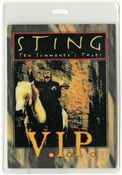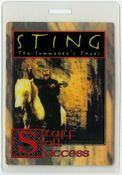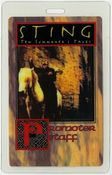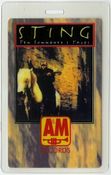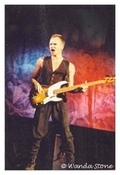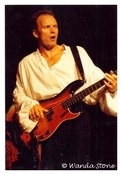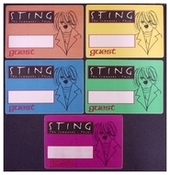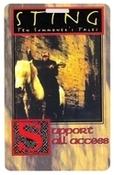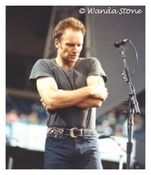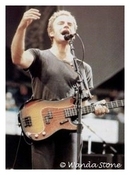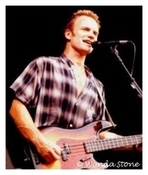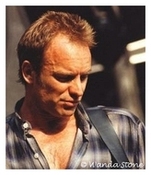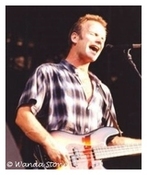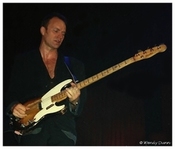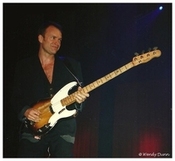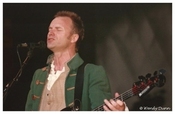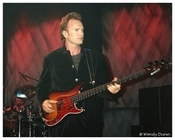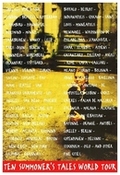
Ode to a cocktail lounge - Sting plays at the Royal Albert Hall...
As Sting asserts on his new single ''IQ is no problem here''. He certainly made a point of proving it. While music benefits from an infusion of intellectual agility, Sting's self-consciousness about it made you ardently support the Keep Rock Stupid campaign. Curiously enough, the Jung-quoting idol also harbours a passion for jazz-funk. This conflict was only uneasily resolved on Wednesday night. The trappings of jazzery - the cool lighting, sleek backing trio, an appearance by 79-year-old harmonica star Larry Adler - were there. And into this setting walked Sting, funkily clad in frock coat and ruffled shirt.
The set list was divided between recent bits and great bits. Sting wrote a dozen of the latter before his mid-eighties discovery of jazz; unfortunately, only a few were resurrected during the evening. 'Roxanne' and 'Every Little Thing She Does Is Magic' were sparkling delights that awakened the band from its torpor. The singer's cool intelligence and that voice were most potently combined on these old Police numbers. The balance of the show was comprised of the 'Ten Summoner's Tales' album (the title is a typically Sting literary reference that also puns on his surname, Sumner) and sundry solo hits. There were many of those, each characterised by cocktail-lounge mutedness. Only Englishman In New York displayed a bit of life, with Sting manifesting a forceful base line on his ode to individuality. It was generally relaxing stuff; your reverie only interrupted by Adler's lovely coda to 'Shape Of My Heart'. Afterwards, Adler made a graceful speech to the effect that he hadn't expected we kids to tolerate an OAP at a rock'n'roll show. He had nothing to worry about. More Adler, less Sumner would have been an admirable equation.
(c) The Guardian by Caroline Sullivan
A Sting in the tale...
Everybody knows that Sting is smart especially Sting himself. Indeed, his career might seem like a run through ways of accommodating smartness within pop.
He was often mocked for his troubles and, in truth, sometimes made himself fair game. He perhaps overplayed the angst of the working-class boy made good, unable, so he might say, to discuss the intricacies of Jung (a favourite read) over a cup of tea with his mum and dad. Still, with a proven skill for a memorable tune and a history of pop success, he could never be faulted for singing the same old song. He was always well informed for 'The Dream of The Blue Turtles' (1985) and 'Nothing Like The Sun' (1987), his first two solo albums, he employed some of the world's finest jazz musicians although the resulting music often seemed most concerned with exhibiting its learning.
For all his wanderings, Sting's real strength remains the same as that which marked Police's output in the late Seventies and early Eighties; a skill for writing cogent, clear, rhythmically sure songs, especially love songs. Obsession has rarely been so precisely caught on song as on 'Every Breath You Take', Sting's biggest seller, performed last Monday, one of three days at the Royal Albert Hall.
But obsession seems currently to be far from his mind. The word is that Sting has loosened up since his last album and performances, preferring now to be the craftsman rather than the navel-gazer. He certainly rushes on stage with all the enthusiastic unselfconsciousness of a children's TV presenter. Dressed in a green frock coat and frilly shirt, this is Sting as Mr Happy-Go-Lucky.
The recent album had suggested a return to lightness. Although the Chaucerian note of the title 'Ten Summoner's Tales', a play on his real name, Gordon Sumner is supported by the sometimes archaic language of the lyrics ('So she took her love/For to gaze a while' please), there are also examples of more nimble writing and several fine tunes. Not to forget the 'interesting time signatures', which Sting has emphasised in recent interviews.
About half his set was drawn from the album. 'Love is Stronger Than Justice', a country Tex-Mex pastiche, and 'Seven Days' are clever exercises in style, while 'It's Probably Me' is another in his line of brooding love songs. All are impeccably played by the excellent band, who include David Sancious and his schizophrenic relationship with his keyboard. One minute he barely brushes against the keys, the next he comes on like Jerry Lee Lewis, crashing into them for all he is worth.
Sting himself is in good form, musically and otherwise. From the bouncing entrance he becomes the benevolent showman, encouraging the band and leading the audience in communal singing. One expects the man who once named an album after Arthur Koestler's 'Ghost In The Machine' to suddenly start throwing out plastic gifts to the crowd.
There is an air of The Last Night of the Proms to the proceedings the audience leaves its seats to form into a swaying mass. To complement that event's well-known classics, Sting draws on the pop canon, including The Beatles' 'A Day In A Life' and confident enough to pick up on audience requests 'Penny Lane'. He has an impressive repertoire of his own, 'Roxanne' recalling how Police deftly grafted reggae to pop.
Sting was always made to make the most of basics he has a classic white blues voice, long on character, with a distinctive rasp, short on range; and his writing is at its best when succinct. Perhaps he has decided that the thing to do with smartness is to carry it lightly.
(c) The Observer by Robert Yates
Sting without sting...
Sting strides on stage at the Royal Albert Hall in a long, ornate, antiquated green overcoat which looks far too warm, and far too silly, to last for long. It doesn't.
After three songs he strips down to a white frilly blouse, inspiring the obligatory half-hearted catcalls. That's as far as I go,'' he apologises with a smile.
Sting is on the third leg of a familiar career path in pop music. First there are the youthful years fronting the popular chart-topping pop group - in his case The Police - when you smile in the photos and sometimes take your shirt off; the fans scream loudest and the tunes are at their catchiest.
Next there are the early years of the solo career, when the photos are in black-and-white with the expressions solemn and the clothes resolutely in place, and when the songs are serious. Sting's were full of jazz flourishes and had lyrics about literature, psychology, the loss of his parents and suchlike.
Then, just as your over anxiety about being taken seriously is in danger of making you a laughing stock, there is a relaxation. Sting's latest album, 'Ten Summoner's Tales', has pretentious colour photos on its sleeve, 12 short impersonal songs with fine simple pop tunes inside. These days he may keep his shirt on but he has a sense of humour about it, and the fans don't care too much anyway.
His current show feeds off his more easy-going mood. There are only four people on stage and, aside from the keyboard player's occasional lapses into I've-got-too- much-talent-not-to-show it bouts of excessive tinkling, they are pleasantly restrained. In between most of the new album, they play as many old Police favourites as songs from Sting's solo career, and the only surprises are populist ones: two spirited but slightly clunky Beatles cover versions, 'Penny Lane' and 'A Day In The Life' (''probably the only song ever written with the words 'Albert Hall' in,'' he points out about the latter).
Nevertheless, as he reels through his repertoire, you notice how many good songs he has written, but how few truly memorable or moving ones. After a while you tire of the stodgy level-headed tastefulness of the ballads, and wish that he would let a little sparseness or harshness creep in. It is sometimes as though Sting uses his musicianship, and that of those he hired to surround him as a sort of comfort blanket.
Before he found fame in The Police he played jazz rock, and one wonders whether the belief is still ingrained somewhere in the back of his mind that many notes are always better than just a few. Larry Adler is the unlikely source of one of the most affecting musical moments, appearing on stage midway through 'Shape of My Heart' to reprise the haunting harmonica solo he played on the recent album version. After his guest spot Adler commandeers the stage to give a short speech about how he has never played at a concert like this in 65 years of show-business. (As this is a decidedly tame affair by pop music standards, one shudders to think how he would cope with Nirvana or the Butthole Surfers.)
This impromptu oration closes with a bizarre compliment to Adler's best: ''At my age it is most unlikely I'll have any more children, so if I ever adopt one, let me say that I would like to adopt Sting.''
Sting, looking a little flummoxed, mutters into his microphone, ''Thanks, dad''.
The two best songs are saved for the final encore: 'Every Breath You Take', tonight disappointingly tripped of its sinister overtones by a jocular you-know-this-one pub knees-up arrangement, and 'Fragile', which retains some of the delicacy its title suggests.
They close a warm good-spirited evening but a slightly empty one. For all his talent Sting rarely avoids seeming just a little too self-conscious and a little too in control for anything to ring quite true. As he sings, he has an annoying habit of making facial expressions that seem to commentate on his lyrics, not complement them. If they do not even command his full involvement, how can he expect them to entrance us?
(c) The Sunday Telegraph by Chris Heath
A Sting in the tale...
Everybody knows that Sting is smart - especially Sting himself. Indeed, his career might seem like a run through ways of accommodating smartness within pop. He was often mocked for his troubles and, in truth, sometimes made himself fair game.
He perhaps overplayed the angst of the working-class boy made good, unable, so he might say, to discuss the intricacies of Jung (a favourite read) over a cup of tea with his mum and dad. Still, with a proven skill for a memorable tune and a history of pop success, he could never faulted for singing the same old song.He was always well informed - for 'The Dream of The Blue Turtles' (1985) and 'Nothing Like The Sun' (1987), his first two solo albums, he employed some of the world's finest jazz musicians - although the resulting music often seemed most confined with exhibiting its learning.
For all his wanderings; Sting's real strength remains the same as that which marked Police's output in the late Seventies and early Eighties; a skill for writing cogent, clear, rhythmically sure songs, especially love songs. Obsession has rarely been so precisely caught on song as on 'Every Breath You Take', Sting's biggest seller, performed last Monday, one of three days at the Royal Albert Hall.
But obsession seems currently to be far from his mind. The word is that Sting has loosened up since his last album and performances, preferring now to be the craftsman rather than the navel-gazer. He certainly rushes on stage with all the enthusiastic unselfconsciousness of a children's TV presenter. Dressed in a green frock coat and frilly shirt, this is Sting as Mr Happy-Go-Lucky.
The recent album had suggested a return to lightness. Although the Chaucerian note of the title - 'Ten Summoner's Tales', a play on his real name, Gordon Sumner - is supported by the sometimes archaic language of the lyrics (''So she took her love/For to gaze a while'' - please), there are also examples of more nimble writing and several fine tunes. Not to forget the ''interesting time signatures'' which Sting has emphasised in recent interviews.
About half his set was drawn from the album. 'Love is Stronger Than Justice', a country Tex-Mex pastiche, and 'Seven Days' are clever exercises in style, while 'It's Probably Me' is another in his line of brooding love songs. All are impeccably played by the excellent band, who include David Sancious and his schizophrenic relationship with his keyboard. One minute he barely brushes against the keys, the next he comes on like Jerry Lee Lewis, crashing into them for all he is worth.
Sting himself is in good form, musically and otherwise. From the bouncing entrance he becomes the benevolent showman, encouraging the band and leading the audience in communal singing. One expects the man who once named an album after Arthur Koestler's 'Ghost In The Machine' to suddenly start throwing out plastic gifts to the crowd. There is an air of The Last Night of the Proms to the proceedings - the audience leaves its seats to form into a swaying mass.
To complement that event's well-known classics, Sting draws on the pop canon, including The Beatles' 'A Day In A Life' and - confident enough to pick up on audience requests - 'Penny Lane'. He has an impressive repertoire of his own, 'Roxanne' recalling how Police deftly grafted reggae to pop.
Sting was always made make the most of basics - has a classic white blues voice, long on character, with a distinctive rasp, short on range; and his writing is at its best when succinct. Perhaps he has decided that the thing to do with smartness is to carry it lightly.
(c) The Independent by Robert Yates
As Sting asserts on his new single ''IQ is no problem here''. He certainly made a point of proving it. While music benefits from an infusion of intellectual agility, Sting's self-consciousness about it made you ardently support the Keep Rock Stupid campaign. Curiously enough, the Jung-quoting idol also harbours a passion for jazz-funk. This conflict was only uneasily resolved on Wednesday night. The trappings of jazzery - the cool lighting, sleek backing trio, an appearance by 79-year-old harmonica star Larry Adler - were there. And into this setting walked Sting, funkily clad in frock coat and ruffled shirt.
The set list was divided between recent bits and great bits. Sting wrote a dozen of the latter before his mid-eighties discovery of jazz; unfortunately, only a few were resurrected during the evening. 'Roxanne' and 'Every Little Thing She Does Is Magic' were sparkling delights that awakened the band from its torpor. The singer's cool intelligence and that voice were most potently combined on these old Police numbers. The balance of the show was comprised of the 'Ten Summoner's Tales' album (the title is a typically Sting literary reference that also puns on his surname, Sumner) and sundry solo hits. There were many of those, each characterised by cocktail-lounge mutedness. Only Englishman In New York displayed a bit of life, with Sting manifesting a forceful base line on his ode to individuality. It was generally relaxing stuff; your reverie only interrupted by Adler's lovely coda to 'Shape Of My Heart'. Afterwards, Adler made a graceful speech to the effect that he hadn't expected we kids to tolerate an OAP at a rock'n'roll show. He had nothing to worry about. More Adler, less Sumner would have been an admirable equation.
(c) The Guardian by Caroline Sullivan
A Sting in the tale...
Everybody knows that Sting is smart especially Sting himself. Indeed, his career might seem like a run through ways of accommodating smartness within pop.
He was often mocked for his troubles and, in truth, sometimes made himself fair game. He perhaps overplayed the angst of the working-class boy made good, unable, so he might say, to discuss the intricacies of Jung (a favourite read) over a cup of tea with his mum and dad. Still, with a proven skill for a memorable tune and a history of pop success, he could never be faulted for singing the same old song. He was always well informed for 'The Dream of The Blue Turtles' (1985) and 'Nothing Like The Sun' (1987), his first two solo albums, he employed some of the world's finest jazz musicians although the resulting music often seemed most concerned with exhibiting its learning.
For all his wanderings, Sting's real strength remains the same as that which marked Police's output in the late Seventies and early Eighties; a skill for writing cogent, clear, rhythmically sure songs, especially love songs. Obsession has rarely been so precisely caught on song as on 'Every Breath You Take', Sting's biggest seller, performed last Monday, one of three days at the Royal Albert Hall.
But obsession seems currently to be far from his mind. The word is that Sting has loosened up since his last album and performances, preferring now to be the craftsman rather than the navel-gazer. He certainly rushes on stage with all the enthusiastic unselfconsciousness of a children's TV presenter. Dressed in a green frock coat and frilly shirt, this is Sting as Mr Happy-Go-Lucky.
The recent album had suggested a return to lightness. Although the Chaucerian note of the title 'Ten Summoner's Tales', a play on his real name, Gordon Sumner is supported by the sometimes archaic language of the lyrics ('So she took her love/For to gaze a while' please), there are also examples of more nimble writing and several fine tunes. Not to forget the 'interesting time signatures', which Sting has emphasised in recent interviews.
About half his set was drawn from the album. 'Love is Stronger Than Justice', a country Tex-Mex pastiche, and 'Seven Days' are clever exercises in style, while 'It's Probably Me' is another in his line of brooding love songs. All are impeccably played by the excellent band, who include David Sancious and his schizophrenic relationship with his keyboard. One minute he barely brushes against the keys, the next he comes on like Jerry Lee Lewis, crashing into them for all he is worth.
Sting himself is in good form, musically and otherwise. From the bouncing entrance he becomes the benevolent showman, encouraging the band and leading the audience in communal singing. One expects the man who once named an album after Arthur Koestler's 'Ghost In The Machine' to suddenly start throwing out plastic gifts to the crowd.
There is an air of The Last Night of the Proms to the proceedings the audience leaves its seats to form into a swaying mass. To complement that event's well-known classics, Sting draws on the pop canon, including The Beatles' 'A Day In A Life' and confident enough to pick up on audience requests 'Penny Lane'. He has an impressive repertoire of his own, 'Roxanne' recalling how Police deftly grafted reggae to pop.
Sting was always made to make the most of basics he has a classic white blues voice, long on character, with a distinctive rasp, short on range; and his writing is at its best when succinct. Perhaps he has decided that the thing to do with smartness is to carry it lightly.
(c) The Observer by Robert Yates
Sting without sting...
Sting strides on stage at the Royal Albert Hall in a long, ornate, antiquated green overcoat which looks far too warm, and far too silly, to last for long. It doesn't.
After three songs he strips down to a white frilly blouse, inspiring the obligatory half-hearted catcalls. That's as far as I go,'' he apologises with a smile.
Sting is on the third leg of a familiar career path in pop music. First there are the youthful years fronting the popular chart-topping pop group - in his case The Police - when you smile in the photos and sometimes take your shirt off; the fans scream loudest and the tunes are at their catchiest.
Next there are the early years of the solo career, when the photos are in black-and-white with the expressions solemn and the clothes resolutely in place, and when the songs are serious. Sting's were full of jazz flourishes and had lyrics about literature, psychology, the loss of his parents and suchlike.
Then, just as your over anxiety about being taken seriously is in danger of making you a laughing stock, there is a relaxation. Sting's latest album, 'Ten Summoner's Tales', has pretentious colour photos on its sleeve, 12 short impersonal songs with fine simple pop tunes inside. These days he may keep his shirt on but he has a sense of humour about it, and the fans don't care too much anyway.
His current show feeds off his more easy-going mood. There are only four people on stage and, aside from the keyboard player's occasional lapses into I've-got-too- much-talent-not-to-show it bouts of excessive tinkling, they are pleasantly restrained. In between most of the new album, they play as many old Police favourites as songs from Sting's solo career, and the only surprises are populist ones: two spirited but slightly clunky Beatles cover versions, 'Penny Lane' and 'A Day In The Life' (''probably the only song ever written with the words 'Albert Hall' in,'' he points out about the latter).
Nevertheless, as he reels through his repertoire, you notice how many good songs he has written, but how few truly memorable or moving ones. After a while you tire of the stodgy level-headed tastefulness of the ballads, and wish that he would let a little sparseness or harshness creep in. It is sometimes as though Sting uses his musicianship, and that of those he hired to surround him as a sort of comfort blanket.
Before he found fame in The Police he played jazz rock, and one wonders whether the belief is still ingrained somewhere in the back of his mind that many notes are always better than just a few. Larry Adler is the unlikely source of one of the most affecting musical moments, appearing on stage midway through 'Shape of My Heart' to reprise the haunting harmonica solo he played on the recent album version. After his guest spot Adler commandeers the stage to give a short speech about how he has never played at a concert like this in 65 years of show-business. (As this is a decidedly tame affair by pop music standards, one shudders to think how he would cope with Nirvana or the Butthole Surfers.)
This impromptu oration closes with a bizarre compliment to Adler's best: ''At my age it is most unlikely I'll have any more children, so if I ever adopt one, let me say that I would like to adopt Sting.''
Sting, looking a little flummoxed, mutters into his microphone, ''Thanks, dad''.
The two best songs are saved for the final encore: 'Every Breath You Take', tonight disappointingly tripped of its sinister overtones by a jocular you-know-this-one pub knees-up arrangement, and 'Fragile', which retains some of the delicacy its title suggests.
They close a warm good-spirited evening but a slightly empty one. For all his talent Sting rarely avoids seeming just a little too self-conscious and a little too in control for anything to ring quite true. As he sings, he has an annoying habit of making facial expressions that seem to commentate on his lyrics, not complement them. If they do not even command his full involvement, how can he expect them to entrance us?
(c) The Sunday Telegraph by Chris Heath
A Sting in the tale...
Everybody knows that Sting is smart - especially Sting himself. Indeed, his career might seem like a run through ways of accommodating smartness within pop. He was often mocked for his troubles and, in truth, sometimes made himself fair game.
He perhaps overplayed the angst of the working-class boy made good, unable, so he might say, to discuss the intricacies of Jung (a favourite read) over a cup of tea with his mum and dad. Still, with a proven skill for a memorable tune and a history of pop success, he could never faulted for singing the same old song.He was always well informed - for 'The Dream of The Blue Turtles' (1985) and 'Nothing Like The Sun' (1987), his first two solo albums, he employed some of the world's finest jazz musicians - although the resulting music often seemed most confined with exhibiting its learning.
For all his wanderings; Sting's real strength remains the same as that which marked Police's output in the late Seventies and early Eighties; a skill for writing cogent, clear, rhythmically sure songs, especially love songs. Obsession has rarely been so precisely caught on song as on 'Every Breath You Take', Sting's biggest seller, performed last Monday, one of three days at the Royal Albert Hall.
But obsession seems currently to be far from his mind. The word is that Sting has loosened up since his last album and performances, preferring now to be the craftsman rather than the navel-gazer. He certainly rushes on stage with all the enthusiastic unselfconsciousness of a children's TV presenter. Dressed in a green frock coat and frilly shirt, this is Sting as Mr Happy-Go-Lucky.
The recent album had suggested a return to lightness. Although the Chaucerian note of the title - 'Ten Summoner's Tales', a play on his real name, Gordon Sumner - is supported by the sometimes archaic language of the lyrics (''So she took her love/For to gaze a while'' - please), there are also examples of more nimble writing and several fine tunes. Not to forget the ''interesting time signatures'' which Sting has emphasised in recent interviews.
About half his set was drawn from the album. 'Love is Stronger Than Justice', a country Tex-Mex pastiche, and 'Seven Days' are clever exercises in style, while 'It's Probably Me' is another in his line of brooding love songs. All are impeccably played by the excellent band, who include David Sancious and his schizophrenic relationship with his keyboard. One minute he barely brushes against the keys, the next he comes on like Jerry Lee Lewis, crashing into them for all he is worth.
Sting himself is in good form, musically and otherwise. From the bouncing entrance he becomes the benevolent showman, encouraging the band and leading the audience in communal singing. One expects the man who once named an album after Arthur Koestler's 'Ghost In The Machine' to suddenly start throwing out plastic gifts to the crowd. There is an air of The Last Night of the Proms to the proceedings - the audience leaves its seats to form into a swaying mass.
To complement that event's well-known classics, Sting draws on the pop canon, including The Beatles' 'A Day In A Life' and - confident enough to pick up on audience requests - 'Penny Lane'. He has an impressive repertoire of his own, 'Roxanne' recalling how Police deftly grafted reggae to pop.
Sting was always made make the most of basics - has a classic white blues voice, long on character, with a distinctive rasp, short on range; and his writing is at its best when succinct. Perhaps he has decided that the thing to do with smartness is to carry it lightly.
(c) The Independent by Robert Yates

